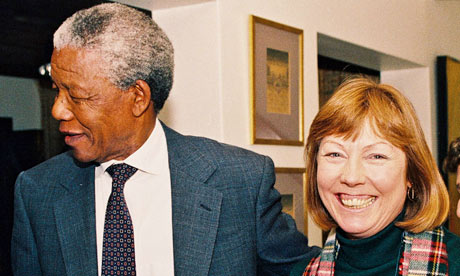
Generations of foreign correspondents, aid workers and policymakers took the pulse of southern Africa not in the embassies and government offices of Pretoria, but in a guesthouse in Melville, a bohemian neighbourhood in Johannesburg. Its owner, Heidi Holland, managed also to be a single mother, investigative journalist, author, expert on Robert Mugabe, freelance diplomat, property dealer and vivacious hostess. She has taken her life at the age of 64.
Every evening, she uncorked bottles of white wine, and with disarmingly direct questions – "Deep down, isn't everyone racist, black and white?" – kept conversations flowing over politics, literature, science and history. The ideas generated fuelled dissertations, articles and books, not least her own.
She had a gift for informality, laughter and putting people at ease. Everyone was "dollface" or "babe". Woe betide the pompous, who found themselves skewered with barbs of humour, and the boring, who found themselves banished.
As an author she will be remembered above all for Dinner with Mugabe, the best book yet written about Zimbabwe's descent into tyranny. It painted an intimate, nuanced, compelling and ultimately damning portrait of a freedom fighter's transformation into a thug.
The title came from an incident in 1975 when, as a young housewife in Salisbury, the capital of white-run Rhodesia, she made dinner at her home for a white liberal friend and Mugabe, then a fugitive guerrilla leader. After dinner she drove him to the railway station while fretting over leaving her baby son sleeping at home. The next day Mugabe rang to thank her and ask after the boy, a human gesture far from the monster of caricature.
Her book, published in 2008, included interviews with key people in Mugabe's life as well as a long talk at the palace with the Zimbabwean president himself, a scoop earned through dogged persistence. Empathetic yet unflinching, it captured the tragedy of an anglophile leader who lashed back at his own people, black and white, after feeling betrayed by Britain. It became required reading for anyone concerned with southern Africa and vaulted its author into a covert effort, ultimately unsuccessful, to initiate dialogue between Mugabe and London.
Heidi – everyone called her by her first name – was born in Johannesburg to a Swiss mother and British father. They soon moved to Southern Rhodesia, then a British colony.
Her father's practice of punishing wayward labourers on his tobacco farm by pinning a baboon tail to them made a lasting impression. How could an otherwise decent man do such a thing? Much of her professional life was spent answering such questions.
Upon leaving school, she worked as a reporter for a local magazine and was a fierce critic of the Rhodesian government's efforts to keep black people out of power – a lonely and brave stand for a white woman. She campaigned for the Centre party, which favoured a transition to majority rule, demonstrating her conviction that journalists and writers must possess, and act on, moral perspectives.
She moved to Johannesburg and wrote a column for the Star as well as books on the African National Congress, magic and a racially tinged murder case. She argued that white South Africans had failed to understand, let alone atone for, apartheid's abuses and damage. At the same time, she assailed the ANC for corruption and mismanagement in power and echoed concerns of her hero, Archbishop Desmond Tutu, that the poor and sick were forgotten.
She is survived by a son from each of her two marriages: the first, to Tony Hull, ended in divorce; her second husband, George Patrikios, died two years after being badly injured in a car crash.
• Heidi Holland, writer, born 6 October 1947; died 11 August 2012

